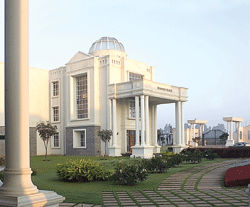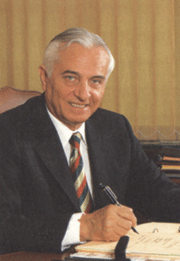Within five years of commencing operations, the garden city’s dedicated International Baccalaureate school has experienced a meteoric rise to the front ranks of the country's international schools
 Within a quinquennium of admitting its first batch of 98 students in 2003, the Indus International School, Bangalore (IISB) — the garden city’s dedicated IB school offering the primary, secondary and higher secondary curricula of the Geneva-based International Baccalaureate Organisation (estb. 1967) — has earned an enviable reputation as the city’s premier co-ed K-12 international school, with an aggregate enrollment of 975 students instructed by 120 handpicked and highly trained teachers. IISB’s meteoric rise to the front ranks of the country’s genuinely international schools was testified by the EducationWorld-C fore Survey of Schools 2008, in which this institution was ranked among the top dozen international schools countrywide, and was particularly highly rated on the parameters of value for money, parental involvement, sports and co-curricular education and individual attention to students (see EW September 2008).
Within a quinquennium of admitting its first batch of 98 students in 2003, the Indus International School, Bangalore (IISB) — the garden city’s dedicated IB school offering the primary, secondary and higher secondary curricula of the Geneva-based International Baccalaureate Organisation (estb. 1967) — has earned an enviable reputation as the city’s premier co-ed K-12 international school, with an aggregate enrollment of 975 students instructed by 120 handpicked and highly trained teachers. IISB’s meteoric rise to the front ranks of the country’s genuinely international schools was testified by the EducationWorld-C fore Survey of Schools 2008, in which this institution was ranked among the top dozen international schools countrywide, and was particularly highly rated on the parameters of value for money, parental involvement, sports and co-curricular education and individual attention to students (see EW September 2008).
By common consensus, much of the credit for IISB’s fast start and quantum leap in the public esteem is given to Lt. Gen (Retd.) Arjun Ray, PVSM and VSM, the much decorated and admired general of the Indian Army (1963-2002) and architect of Operation Sadbhavana (which pioneered army-people contact through the use of civilian volunteers in Ladakh), who took premature retirement from commanding the 14th Corps to kick-start IISB in 2002. “I took charge as the CEO of the Indus Trust on April 1, 2002 and helped in designing and constructing IISB, which admitted its first batch of students in June 2003,” recalls Ray.
Since then the number of Doric-style buildings on the school’s campus, which sprawls across 40 acres of verdant meadow in Sarjapur in suburban Bangalore, has grown to 12 and includes the primary, middle and senior school blocks with separate residential complexes for male and female students. Indeed the distinguishing characteristic of IISB is its state-of-the art campus, with extensive provision for co-curricular and extra-curricular education, designed by celebrity architect Dinesh Verma.
 “The prime objective of IISB is to create leaders of tomorrow. In our opinion this requires identifying the aptitude of each student and developing his/her inner potential. This is why in IISB there’s huge emphasis on balanced, holistic education which extends beyond academic excellence. Our formula for nurturing tomorrow’s leaders is to teach students to first become servants of the community, and later through the exercise of leadership skills to help transform communities and society,” says Gen. Ray who chose the school’s motto in omnia paratus (“prepared for all challenges”) six years ago.
“The prime objective of IISB is to create leaders of tomorrow. In our opinion this requires identifying the aptitude of each student and developing his/her inner potential. This is why in IISB there’s huge emphasis on balanced, holistic education which extends beyond academic excellence. Our formula for nurturing tomorrow’s leaders is to teach students to first become servants of the community, and later through the exercise of leadership skills to help transform communities and society,” says Gen. Ray who chose the school’s motto in omnia paratus (“prepared for all challenges”) six years ago.
Attainment of the lofty goals that the management has set for this full spectrum IB school, has not only resulted in a highly-enabling infrastructure for students, but also heavy investment in teacher recruitment and development. To recruit its faculty, the IISB management casts its net countrywide and offers perhaps the best pay scales ranging from Rs.6-18 lakh per year plus an array of perquisites, to its 120 teachers. Moreover to develop teachers, drawn from the country’s best colleges and universities, the school has recently promoted a fully-fledged in-house Teaching Institute which will train them to acquire world class pedagogical skills.
The institutional objective of nurturing global leaders of tomorrow has prompted IISB to opt for the well-rounded syllabus and curricula of the IBO whose school-leaving class XII certificate is arguably the most acceptable to top-ranked universities around the world, and is also recognised by the Association of Indian Universities. “We believe that IBO’s primary, middle years and higher secondary curricula are the most balanced worldwide. And it’s an indicator of the extent to which we have mastered the delivery of IBO’s testing curricula that in our batch of 63 class XII school leavers last year, 47 passed with distinction,” says Sarojini Rao, an economics alumna of Pune and Madras universities who has been the principal of this pace-setting IB school since 2006.
In keeping with the best traditions of boarding schools, extensive provision has been made for games and sports. Apart from facilities for field games (hockey, cricket and football), IISB offers students the options of training for track and field events, horse riding and show jumping, tennis, badminton, squash, swimming and basketball, with Bangalore’s pleasant climate enabling sports and games activities round the year.
Against this backdrop of IISB establishing itself as a unique, self-sustaining, benchmark K-12 school, whose enrollment is on the threshold of maxi-mum capacity despite its relatively high fee structure (attributed to the cost of IB affiliation and teacher training), it’s hardly surprising that the Indus Trust has taken the decision to replicate this success model. Recently two new Indus International schools in Hyderabad and Pune inducted their first batches of students, and the Indus Trust has passed a resolution to establish another 15 schools across the country within the next five years.
“Secondary and higher secondary education in India has been frozen in time for over four decades. There is an urgent need to reform the school system to produce thinkers and leaders with problem-solving mindsets, who can confront the complex challenges of the new globalised world. Our goal is to establish Indus International schools — some of which will also offer the CBSE and ICSE curriculums — countrywide as model institutions accessible to all, to set new benchmarks and sharply upgrade standards of school education,” says Gen. Ray.
Quite evidently the school education reform mission of the visionary members of the Indus Trust has just begun.
|
Admission & fees
Indus International School, Bangalore is an exclusively IB school offering the primary, secondary and higher secondary curricula of the Geneva-based IBO. It also offers the curriculum of the UK-based Cambridge International Examinations for classes VI-X.
Admission into the school is subject to vacancies in appropriate classes and based on written tests. Registration forms must be submitted with a demand draft of Rs.7,500. The school accepts boarders from class V onwards.
Admission fee (one-time): Rs.77,500-152,500
Tuition fees (per year):
Kindergarten: Rs.1.9 lakh
Classes I-IV: Rs.3.6 lakh
Classes V-XII: Rs.3.8 lakh (day scholars)-5.95 lakh (boarders)
For further information write to the Admissions Officer, Billapura Cross, Sarjapur, Bangalore 562 125. Ph: +91 80 22895909; e-mail: admissions@ indusschool.com; website: www.indusschool.com.
|
Dilip Thakore (Bangalore)